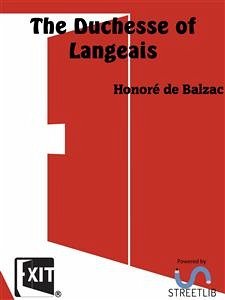THE DUCHESSE OF LANGEAIS
In a Spanish city on an island in the Mediterranean, there stands a convent of the Order of Barefoot Carmelites, where the rule instituted by St. Theresa is still preserved with all the first rigor of the reformation brought about by that illustrious woman. Extraordinary as this may seem, it is none the less true. Almost every religious house in the Peninsula, or in Europe for that matter, was either destroyed or disorganized by the outbreak of the French Revolution and the Napoleonic wars; but as this island was protected through those times by the English fleet, its wealthy convent and peaceable inhabitants were secure from the general trouble and spoliation. The storms of many kinds which shook the first fifteen years of the nineteenth century spent their force before they reached those cliffs at so short a distance from the coast of Andalusia.
If the rumour of the Emperor's name so much as reached the shore of the island, it is doubtful whether the holy women kneeling in the cloisters grasped the reality of his dream-like progress of glory, or the majesty that blazed in flame across kingdom after kingdom during his meteor life.
In a Spanish city on an island in the Mediterranean, there stands a convent of the Order of Barefoot Carmelites, where the rule instituted by St. Theresa is still preserved with all the first rigor of the reformation brought about by that illustrious woman. Extraordinary as this may seem, it is none the less true. Almost every religious house in the Peninsula, or in Europe for that matter, was either destroyed or disorganized by the outbreak of the French Revolution and the Napoleonic wars; but as this island was protected through those times by the English fleet, its wealthy convent and peaceable inhabitants were secure from the general trouble and spoliation. The storms of many kinds which shook the first fifteen years of the nineteenth century spent their force before they reached those cliffs at so short a distance from the coast of Andalusia.
If the rumour of the Emperor's name so much as reached the shore of the island, it is doubtful whether the holy women kneeling in the cloisters grasped the reality of his dream-like progress of glory, or the majesty that blazed in flame across kingdom after kingdom during his meteor life.









